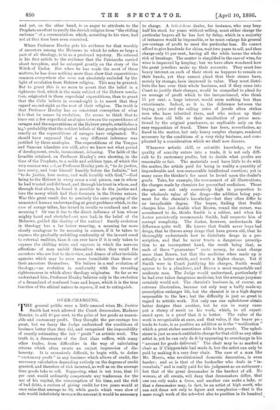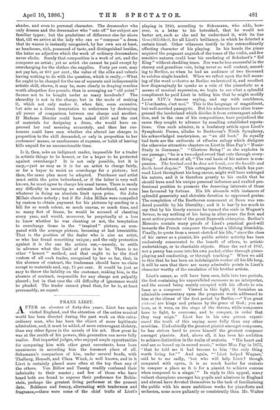OVER-CHARGING.
THE general public were a little amazed when Mr. Justice Smith last week allowed the Court dressmaker, Madame Mercier, to add 40 per cent, to the price of her goods as reason- able and customary profit. They thought the per-centage too great, but we fancy the Judge understood the conditions of business better than they did, and recognised the impossibility of exactly estimating the fair " profit " on artistic work. The truth is, a dressmaker of the first class suffers, with many other trades, from difficulties in the way of calculating returns which often create an unjust impression of dis- honesty. It is excessively difficult, to begin with, to define "customary profit" in any business which allows of credit, the necessary calculation depending entirely on the degrees of credit granted, and therefore of risk incurred, as well as on the average time goods take to sell. Supposing. what is not true, that 15 per cent. would ordinarily compensate any tradesman for the use of his capital, the consumption of his time, and the risk of bad debts, a custom of giving credit for two years would at once raise that average to 30, while goods which were slow of sale would indefinitely increase the amount it would be necessary
to charge. A brie-a-brac dealer, for instance, who may keep half his stock for years without selling, must either charge the particular buyers all he has lost by delay, which in a majority of instances would be impossible, or he must enlarge his general per-centage of profit to meet the particular loss. He cannot afford to give hundreds for china, wait two years to sell, and then charge only 15 per cent., having all the while borne the whole risk of breakage. The matter is simplified in the case of wine, for wine is improved by keeping ; but we have often wondered how the great jewellers make up their accounts. They must lose heavy interest on such of their stock as happens to remain on their hands, yet they cannot plead that their stones have, merely by storage, been improved in value. They must distri- bute the loss over their whole business, and if they came into Court to justify their charges, would be compelled to plead for an average of profit which to the inexperienced, who think 15 per cent, a large interest, would seem nothing less than extortionate. Indeed, as it is, the difference between the baying price and the selling price of jewels often strikes men who have inherited them, and who reckon up their value from old bills or their recollection of prices men- tioned by the original purchasers, as explicable only on the easy supposition of fraud. There has been, nevertheless, no fraud in the matter, but only heavy surplus charges, rendered necessary by the conditions of a very risky business, and com- plicated by a consideration which we shall now discuss.
Whenever artistic skill, or scientific knowledge, or the quality of scarcity enters into a trade, it is not only diffi- cult to fix customary profits, but to decide what profits are reasonable or fair. The materials used have little to do with the matter, the article paid for being in reality a quantity of imponderable and non-measurable intellectual exertion ; yet in many cases the thinker's fee must be levied upon the dealer's goods. Take, for example, the commonest of all illustrations, the charges made by chemists for prescribed medicines. Those charges are not only excessively high in proportion to the wholesale value of the drugs—the addition being pay- ment for the chemist's knowledge—but they often differ to an inexplicable degree. The buyer, finding that Smith charges him just double what Brown, round the corner, was accustomed to do, thinks Smith is a robber, and when his doctor persistently recommends Smith, half suspects him of corrupt complicity. The doctor, however, understands the difference quite well. He knows that Smith never buys bad drugs, that he throws away drugs that have grown old, that he thoroughly understands how to distribute drugs in a pre- scription, and that he never trusts a dangerous prescrip- tion to an incompetent hand, the result being that, as each of these " guarantees " costs money, he must charge more than Brown, but that the medicine when made up is actually a better article, and worth a higher charge. Yet if Smith were in Coast justifying his charges, Smith would appear to be a plunderer, and Brown a most respectable and moderate man. The Judge would understand, particularly if he had ever taken dangerous medicine, but the average juryman certainly would not. The chemist's business is, of course, an extreme illustration, ,because not only may a badly made-up prescription endanger life, but the chemist is in a high degree responsible to the law ; but the difficulty is just as great in regard to artistic work. Not only can one upholsterer obtain better designs than another, but he can in many cases put a stamp of merit on his work, which, to all experi- enced eyes, is a proof that it is better. The value of the work is recognisable at once, and that value, if the buyer pis - tends to taste, is as positive an addition as is the " verification " which a great etcher sometimes adds to his proofs. The uphol- sterer is just as much entitled to charge for that skill as any other artist is, yet he can only do it by appearing to overcharge in his
account for goods delivered." The chair may be as marked a chair as if Chippendale had made it, but the artist can only be paid by making it a very dear chair. The case of a man like Mr. Morris, who revolutionised domestic decoration, is even harder ; and so is that of the bookseller who deals in " in- cunabula," and is really paid for his judgment as an antiquary ; but that of the great dressmaker is the hardest of all. No woman, at all events, will deny that dressmakers differ, that one can only make a dress, and another can make a lady, or that a dressmaker may, in fact, be an artist of high merit, who can suit dress not only to figure and complexion—that is the mere rough work of the art—but also to position in its hundred •
shades, and even to personal character. The dressmaker who only dresses and the dressmaker who "sets off" her subject are familiar types ; but the gradations of difference rise far above that, till we arrive at the lady who can so " compose " a dress, that its wearer is instantly recognised, by her own sex at least, as handsome, rich, possessed of taste, and distinguished besides, the latter an adjective which the work of ordinary dressmakers never elicits. Surely that composition is a work of art, and the composer an artist ; yet as artist she cannot be paid except by overcharging for the clothes she supplies. Forty per cent. may not pay her, or 400 per cent., the value of the silks and velvets having nothing to do with the question, which is really,—What fee ought to be charged for the use of separate and indispensable artistic skill, shown, it may be, more clearly in draping muslins worth altogether five pounds, than in arranging an "old point" flounce not to be bought under as many hundreds ? The absurdity is not in the charge, but in the mode of making it, which not only makes it, when fair, seem excessive, but acts as a direct temptation to unfairness by destroying all power of comparison between one charge and another. If Madame Mercier could have asked 2100 and the cost of materials for designing a dress, she would have ex- pressed her real meaning accurately, and then her cus- tomers could have seen whether she altered her charges in proportion to the skill demanded, or only in proportion to her customers' means, or carelessness of expense, or habit of leaving bills unpaid for an unconscionable time.
Is it, then, asks an indignant reader, impossible for a trader in artistic things to be honest, or for a buyer to be protected against overcharge ? It is not only possible, but it is easy,—just as easy as it is for an artist to charge fairly, or for a buyer to resist an overcharge for a picture ; but then, the same plan must be adopted. Purchaser and artist must settle the price beforehand, or if the latter is very well known, he must agree to charge his usual terms. There is rarely any difficulty in securing an estimate beforehand, and none whatever in fixing an absolute limit upon price. Sir John Millais cheats nobody ; but if Sir John Millais were compelled by custom to obtain payment for his pictures by sending in a bill for so much colour, so much canvas, so much time, and so many feet of frame, he would be accused of cheating every year, and would, moreover, be perpetually at a loss to know whether he was cheating or not, the temptation to overcharge items in the "inspired" picture, as com- pared with the average picture, becoming at last irresistible. That is the position of the dealer who is also an artist, or who has found something unique ; and the only protection against it is the one the artists use,—namely, to settle in advance what the limit of price is to be. There is no other "honest " method, and that ought to be the fixed custom of all such trades, recognised by law so far, that, in the absence of contract, the tradesman should have no claim except to materials and, say, 15 per cent. It would be just as easy to throw the liability on the customer, making him, in the absence of contract, responsible for any charge not palpably absurd ; but in that case the old difficulty of ignorance would be pleaded. The trader cannot plead that, for he is, at least presumably, an expert.



































 Previous page
Previous page